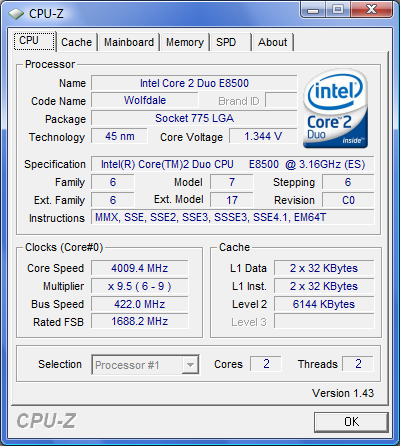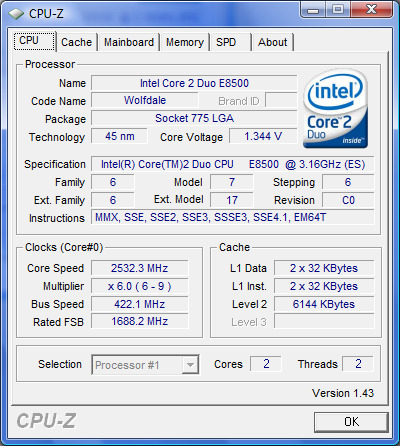Overclocking Intel's Wolfdale E8000
Second Step: 4 GHz (FSB1688)
A clock speed of 4 GHz could be reached using Gigabyte's auto overclocking mechanism, but it wouldn't provide more voltage to the motherboard components, which we found was required to achieve higher clock speeds.
We tried 4 GHz next. Since the automatic overclocking would not allow us to reach stable processor operation at 4 GHz and above due to missing voltage support, we decided to go ahead with manual settings. A 422 MHz system speed times 9.5 would give us a 4009 MHz clock speed. While 1.345 V core voltage was still enough to run 4009 MHz, we had to adjust the chipset voltage of the X38 by +0.25 V, the FSB voltage by +0.15 V and the memory voltage by +0.3 V, as the DDR2 memory clock speed increased from 400 to 422 MHz as well. We did not change the timings, hence we had to increase the voltage to maintain them.
I found it nice to see that Intel's Enhanced SpeedStep feature, which was designed to reduce the clock speed and the core voltage when the processor runs at low processing loads or idle, was fully implemented and worked properly in the test system. While the system speed and memory speed are not affected by SpeedStep, the core voltage typically is. In the overclocked scenario, however, we would not want the system to reduce the CPU voltage as well, as the 0.95 V core voltage required for a 2000 MHz core clock (333 MHz x6) at default settings would never be enough to maintain reliable operation at the overclocked 2532 MHz in SpeedStep mode (422 MHz x6). The reduction in clock speed alone provides for some power savings.
It was interesting to see that the Enhanced SpeedStep still worked when the system was highly overclocked. The multiplier drops from x9.5 to x6 when the system is idle.
Get Tom's Hardware's best news and in-depth reviews, straight to your inbox.
Current page: Second Step: 4 GHz (FSB1688)
Prev Page First Step: 400 MHz FSB And 3.8 GHz Next Page Third Step: 4.2 GHz (FSB1772)
Patrick Schmid was the editor-in-chief for Tom's Hardware from 2005 to 2006. He wrote numerous articles on a wide range of hardware topics, including storage, CPUs, and system builds.
-
LLJones What? Seriously? No one was reading Tom's back at this time or what?Reply
Good article as I am revamping and older system and want to know how the Wolfdale OC'd. Thanx for the info.

